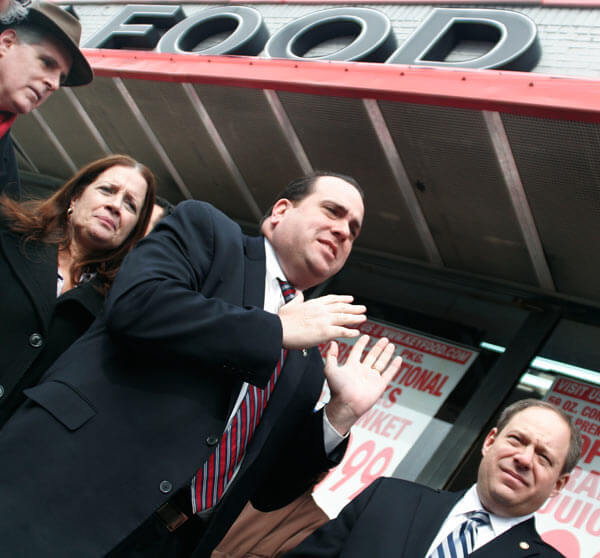By Joe Anuta
Residents south of the Long Island Expressway in Electchester do not want to see their Key Food go, but the landlord seems dead set on giving the grocer the boot and bringing in a big-box pharmacy instead.
Shoppers and elected officials held a Feb. 8 rally outside the store, at 164-05 69th Ave., to send a message to Brooklyn landlord George Butsikaris that they do not want a CVS pharmacy to take over the lease.
“He has the right to do what he wants as a business,” said state Assemblyman Michael Simanowitz (D-Electchester), who shops at the store from his nearby home. “But we are not going to support a CVS.”
Butsikaris did not respond to a request to comment.
Simanowitz rattled off a list of eight other pharmacies that already exist in the immediate area, including True Care Pharmacy across the street, which rents from Butsikaris and would end up competing with the big-box pharmacy, according to Dave Mandell, who owns the Key Food with his brother.
Mandell has offered to pay Butsikaris more rent in an attempt to match what CVS would pay, but has been turned down.
In 2004, he took over the Key Food store, which has existed for several decades, but the lease will run out in four years.
He would like to renovate the store and sign a new lease for another 20 years, but his offers have been flatly rejected by Butsikaris, he said.
Like CVS, Key Food is a chain, but there are important differences, according to Mandell.
CVS is a publicly traded company. In fiscal year 2010, it had $96.4 billion in revenues and made an operating profit of a little more than $6 billion, according to its latest annual report. It has 65,000 pharmacies across the country, which are not owned by individuals but run by managers.
Key Food, on the other hand, has about 100 stores throughout the five boroughs and the New Jersey area, according to its website.
It is not a publicly traded company but rather a co-op. That means individual people like Mandell own each store and take a share of the company’s profits as a whole at the end of each year. It also means that Mandell has a personal stake in seeing that the store is run correctly, he said.
Owners of smaller businesses like Key Food are often passed over by landlords for bigger corporate chains because of the enormous revenues generated by big-box stores like CVS, according to Mandell.
“The banks love CVS because it is a billion-dollar company,” he said.
And since CVS has a much larger bottom line, there is less chance in the landlord’s and bank’s minds that CVS will ever default to pay its rent.
If the CVS does come in, it will employ fewer people, according to Mandell, who currently employs all union workers who receive pensions, health care, vision and dental.
Reach reporter Joe Anuta by e-mail at januta@cnglocal.com or by phone at 718-260-4566.
































